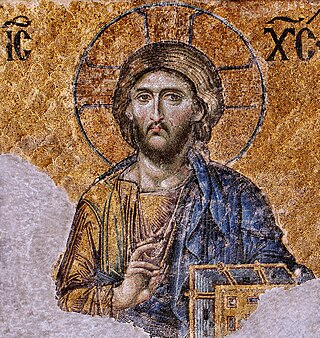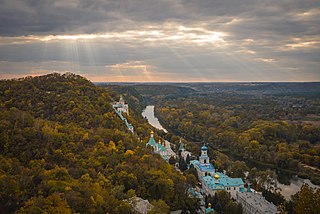This is a directory of patriarchs, archbishops, and bishops across various Christian denominations. To find an individual who was a bishop, see the most relevant article linked below or Category:Bishops.

The Malankara Orthodox Syrian Church (MOSC) also known as the Indian Orthodox Church (IOC) or simply as the Malankara Church, is an autocephalous Oriental Orthodox church headquartered in Devalokam, near Kottayam, India. The church serves India's Saint Thomas Christian population. According to tradition, these communities originated in the missions of Thomas the Apostle in the 1st century. It employs the Malankara Rite, an Indian form of the West Syriac liturgical rite.

The highest-ranking bishops in Eastern Orthodoxy, Oriental Orthodoxy, the Catholic Church, the Hussite Church, Church of the East, and some Independent Catholic Churches are termed patriarchs.

Patriarchate is an ecclesiological term in Christianity, designating the office and jurisdiction of an ecclesiastical patriarch. According to Christian tradition three patriarchates were established by the apostles as apostolic sees in the 1st century: Rome, Antioch, and Alexandria. Constantinople was added in the 4th century and Jerusalem in the 5th century. Eventually, together, these five were recognised as the pentarchy by the Council of Ephesus in 431.

An exarch was the holder of any of various historical offices, some of them being political or military and others being ecclesiastical.
An apostolic see is an episcopal see whose foundation is attributed to one or more of the apostles of Jesus or to one of their close associates. In Catholicism the phrase, preceded by the definite article and usually capitalized, refers to the See of Rome.

A lavra or laura is a type of monastery consisting of a cluster of cells or caves for hermits, with a church and sometimes a refectory at the center. It is erected within the Orthodox and other Eastern Christian traditions. The term is also used by some Roman Catholic communities. The term in Greek initially meant a narrow lane or an alley in a city.
A catholicos is the head of certain churches in some Eastern Christian traditions. The title implies autocephaly and, in some cases, it is the title of the head of an autonomous church. The word comes from ancient Greek καθολικός, derived from καθ' ὅλου from κατά and ὅλος, meaning "concerning the whole, universal, general"; it originally designated a financial or civil office in the Roman Empire.
Patriarchate of Jerusalem may refer to:
The title of patriarchs of the East is used by primates of several Christian denominations within Eastern Christianity. Historically, the title originated as ecclesiastical designation for primates of the Church of the East. It was, and still is, officially used by different branches of the historical Church of the East.

Christianity in Lebanon has a long and continuous history. Biblical Scriptures purport that Peter and Paul evangelized the Phoenicians, whom they affiliated to the ancient patriarchate of Antioch. The spread of Christianity in Lebanon was very slow where paganism persisted, especially in the mountaintop strongholds of Mount Lebanon. A 2015 study estimates some 2,500 Lebanese Christians have Muslim ancestry, whereas the majority of Lebanese Christians are direct descendants of the original early Christians.
This is a directory of patriarchs across various Christian denominations.

Christianity has been, historically, a Middle Eastern religion with its origin in Judaism. Eastern Christianity refers collectively to the Christian traditions and churches which developed in the Middle East, Egypt, Asia Minor, the Far East, Balkans, Eastern Europe, Northeastern Africa and southern India over several centuries of religious antiquity. It is contrasted with Western Christianity, which developed in Western Europe. As a historical definition the term relates to the earliest Christian communities and their long-standing traditions that still exist.
Only-Begotten Son, sometimes called "Justinian's Hymn", the "Anthem of Orthodoxy" and/or the "Hymn of the Incarnation", is an ancient Christian hymn that was composed prior to the middle of the 6th century. It is chanted at the end of the Second Antiphon during the Divine Liturgies of St John Chrysostom, St Basil the Great and of St Gregory the Illuminator, and at the Little Entrance during the Liturgy of Saint James.

The Oriental Orthodox Churches are Eastern Christian churches adhering to Miaphysite Christology, with approximately 60 million members worldwide. The Oriental Orthodox Churches are part of the Nicene Christian tradition, and represent one of its oldest branches.

Articles related to Christianity include:
In Christianity, the concept of an Apostolic Throne refers to one of the historic Patriarchates that was associated with a specific apostle. Not all of the apostles are associated with specific "thrones"; in general, the phrase applies to Apostles that presided over a specific geographic church. Notably, there is no apostolic throne associated with St. Paul, who along with St. Peter was present, at different times, in both Antioch and Rome (where both Peter and Paul were crucified. The phrase is also somewhat interchangeable with the "Apostolic See".
The term Orthodox Patriarch may refer to:
The Eastern Catholic Churches of the Catholic Church utilize liturgies originating in Eastern Christianity, distinguishing them from the majority of Catholic liturgies which are celebrated according to the Latin liturgical rites of the Latin Church. While some of these sui iuris churches are of the same liturgical ritual families as other Eastern Catholic churches and Eastern churches not in full communion with Rome, each church retains the right to institute its own canonical norms, liturgical books, and practices for the ritual celebration of the Eucharist, other sacraments, and canonical hours.








